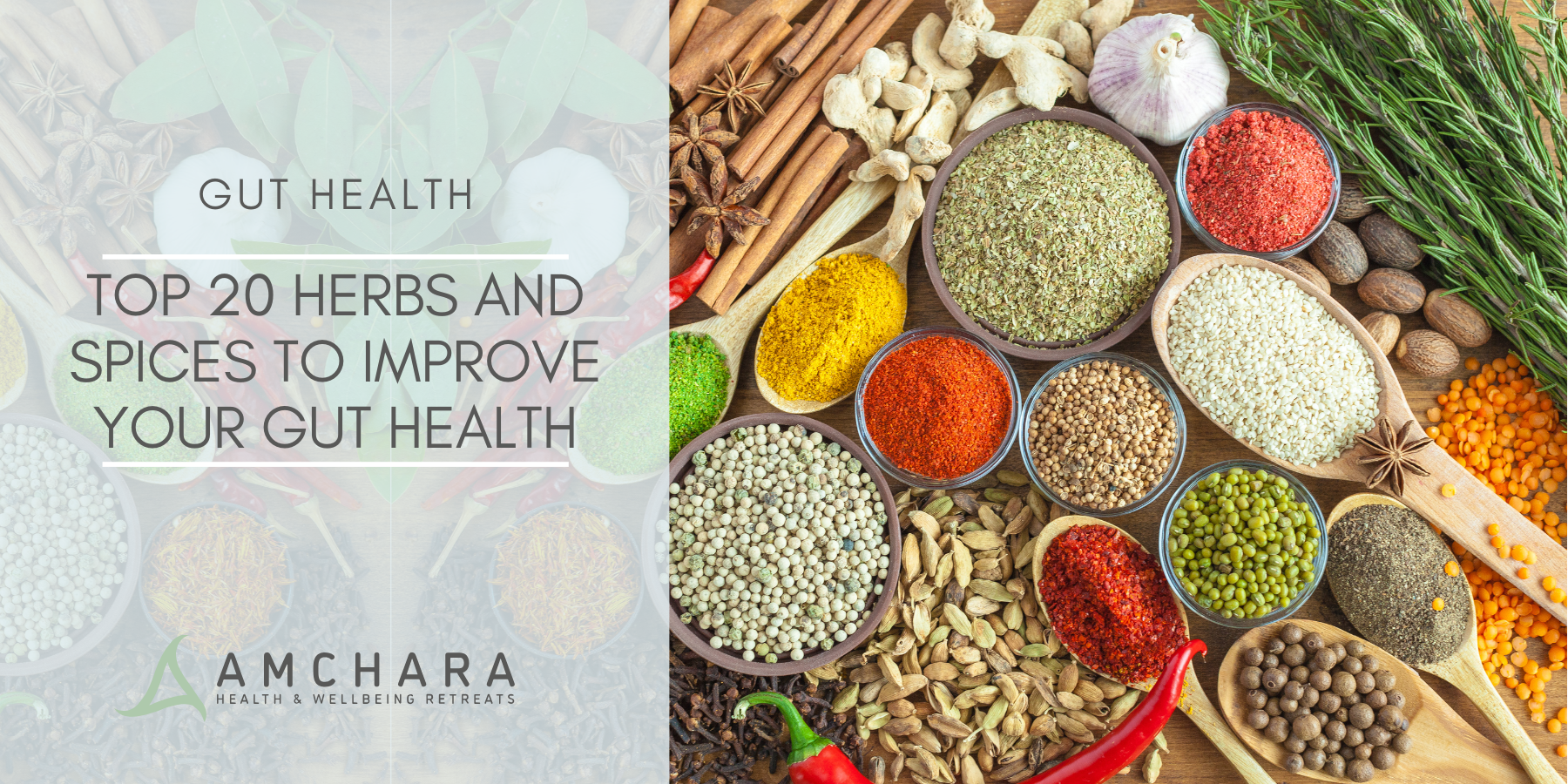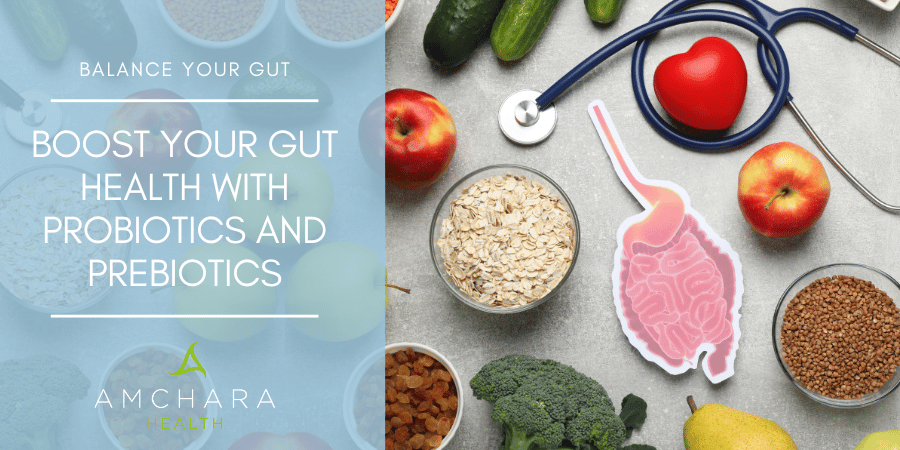Your gut is at the foundation of your health, impacting your digestion, immunity, mood, and brain function. A simple way to enhance your gut health is by incorporating herbs and spices into your diet regularly.
These culinary staples are rich in polyphenols – plant compounds that act as prebiotics and support the growth of beneficial gut bacteria. Studies show that herbs and spices play a significant role in promoting a healthy gut microbiome.
In the modern internet world there is an overwhelming amount of information; it can be hard to find health advice that you can trust, particularly as the main media channels are typically dominated with a single, orthodox narrative.
We always take an evidence-based approach, orientated towards a holistic and Personalised Health approach, and aim to provide you with actionable knowledge and tips to help you on your journey to optimal health.
In this article we’ll look at 20 herbs and spices that can improve your gut health, and tips on how to incorporate them into your diet.
Top herbs for gut health
Also known as cilantro, coriander is a versatile herb, rich in antioxidants like polyphenols, which may help reduce oxidative stress and inflammation in the digestive tract, as well as relieving indigestion, bloating and constipation. It helps to create an environment for your beneficial gut bacteria to flourish.
Coriander’s essential oils, such as linalool, have carminative properties that ease bloating, gas, and stomach discomfort. These oils also possess mild antimicrobial effects, helping to balance gut bacteria and combat harmful pathogens.
Coriander supports liver function by enhancing detoxification and bile production, essential for breaking down and absorbing fats. This makes it particularly beneficial for alleviating digestive sluggishness.
Studies have suggested that coriander seeds can reduce blood sugar.
Easily incorporated into meals, coriander can be used fresh as leaves in salads and soups or as ground or whole seeds in spice blends.
This fragrant herb is packed with antioxidants like thymol and carvacrol. Antimicrobial properties combat harmful bacteria, fungi, and parasites, supporting a balanced gut microbiome. Oregano soothes the digestive tract, reducing inflammation and discomfort, while stimulating bile production to aid fat breakdown and absorption.
High in fibre, oregano promotes healthy digestion by encouraging regular bowel movements and nourishing beneficial gut bacteria.
Use fresh in salads, soups, or as a topping, or add dried oregano to marinades and pasta sauces.
This vibrant herb is often used as a garnish. Rich in dietary fibre, it aids digestion by promoting regular bowel movements and reducing constipation. It also acts as a mild diuretic, helping to reduce water retention and bloating.
Packed with antioxidants like flavonoids and vitamin C, parsley combats oxidative stress. Its anti-inflammatory properties help soothe the digestive tract, easing discomfort associated with conditions like irritable bowel syndrome (IBS) and indigestion.
Parsley contains chlorophyll, a compound known for its detoxifying effects. Chlorophyll may help neutralise harmful toxins and support a healthier gut microbiome.
Add to soups, salads, and smoothies, or use as a fresh garnish.
A fragrant herb often used in Mediterranean cuisine, thyme’s essential oils, particularly thymol and carvacrol, possess potent antimicrobial and antioxidant properties that help combat harmful bacteria in the digestive system, while supporting the growth of beneficial gut flora.
Rich in antioxidants such as flavonoids and vitamin C, thyme helps reduce inflammation and oxidative stress, protecting the intestinal lining from damage. This can improve digestion and alleviate discomfort associated with conditions like irritable bowel syndrome (IBS) and bloating.
Thyme is known to stimulate the production of digestive enzymes, which help to break down food, enabling you to absorb nutrients more effectively.
Add fresh to soups and stews or brew as a soothing herbal tea.
This fragrant herb offers a range of health benefits. Rich in antioxidants including rosmarinic acid, it helps combat oxidative stress and inflammation in the digestive tract, supporting a healthy gut environment.
Its antimicrobial properties target harmful bacteria in the gut while leaving beneficial microbes intact, contributing to a balanced microbiome. Rosemary also promotes proper digestion by stimulating the production of bile, a substance essential for breaking down fats and aiding nutrient absorption.
Additionally, rosemary may help alleviate digestive discomfort, such as bloating or cramping, by relaxing the smooth muscles of the digestive system.
Use it to season roasted vegetables, meats, or soups, or brew for a soothing herbal tea.
A versatile and aromatic herb, mint is renowned for its soothing properties. Its active compound, menthol, helps relax the smooth muscles of the digestive tract, making it effective in relieving symptoms like bloating, gas, and cramping.
Mint has antispasmodic properties, which can alleviate discomfort associated with conditions like irritable bowel syndrome (IBS). It also stimulates bile flow, enhancing digestion.
Mint has mild antimicrobial effects that can help balance gut bacteria by reducing harmful pathogens while supporting beneficial microbes.
Add fresh leaves to salads, smoothies, or infuse in water or tea.
Basil, a fragrant herb, is rich in essential oils like eugenol and linalool, giving it potent anti-inflammatory and antimicrobial properties that help maintain a healthy balance of gut bacteria.
Basil supports the production of digestive enzymes, aiding the breakdown of food and reducing discomfort associated with indigestion or bloating. It also has carminative properties.
It is a good source of antioxidants and polyphenols, which protect the gut lining from oxidative stress and inflammation. These compounds support the gut microbiome, fostering a thriving environment for beneficial bacteria.
Add fresh to salads, sauces, or soups, or blend into pestos.
Sage is a fragrant herb with a rich history of medicinal use. Packed with polyphenols and antioxidants, sage helps combat inflammation in the digestive tract, promoting a healthy gut lining.
The herb’s antimicrobial properties are particularly beneficial, inhibiting the growth of harmful bacteria and pathogens, supporting the proliferation of beneficial microbes essential for digestion and overall gut health.
Sage is another herb known for its carminative effects.
Add to soups, stews, or roasted vegetables, or as a tea.
Aromatic bay leaves are often used to flavour soups, stews, and sauces. Rich in polyphenols, which act as antioxidants to reduce inflammation in the digestive tract, bay leaves can help support overall digestive comfort and resilience by soothing the gut lining.
The essential oils in bay leaves, such as eugenol, possess antimicrobial properties that may help regulate the gut microbiome. Bay leaves are also known for their carminative effect.
Simmer in broths, curries, stews or take infused in teas, ensuring the leaves are removed before consumption.
Rich in antioxidants and essential oils, dill can help promote digestion by stimulating the production of digestive enzymes, and reduces symptoms like indigestion and bloating.
Its antimicrobial effects may help balance the gut microbiome. Dill contains fibre, which contributes to regular bowel movements and improved digestion. The herb’s anti-inflammatory properties help soothe the gastrointestinal tract, promoting better gut motility and reducing symptoms of irritable bowel syndrome (IBS).
Add to salads, soups, or take as a tea.
Top spices for gut health
This popular spice is known for its warm, earthy flavour,. Rich in antioxidants, cumin protects the digestive system from oxidative stress. With carminative properties aiding smoother digestion, cumin also stimulates the production of bile, essential for the breakdown and absorption of fats. This action supports a healthy digestive process and may reduce symptoms of discomfort like acid reflux or indigestion.
The spice’s antimicrobial and anti-inflammatory properties help maintain a balanced gut microbiome, promoting the growth of beneficial bacteria, while inhibiting harmful microbes.
Try adding it to soups, stews, curries, or teas, or as a seasoning for roasted vegetables.
Known for its vibrant yellow colour and distinctive earthy flavour, turmeric is a powerful spice, containing compounds called curcuminoids that exert medicinal properties. The most important curcuminoid in turmeric, curcumin, has potent anti-inflammatory and antioxidant properties, which help soothe inflammation in the digestive tract, partly by neutralising damaging free radicals. This can be especially beneficial for conditions like irritable bowel syndrome (IBS) or inflammatory bowel disease (IBD).
Curcumin also supports the balance of gut bacteria, promoting a healthy microbiome, which is essential for optimal digestion and overall health.
Studies show that curcumin exerts major benefits on your gut health as well as your brain and other aspects of bodily functioning, a truly powerful addition to your diet.
Try adding turmeric to curries, soups, smoothies, or teas. Pairing it with black pepper (which contains piperine) enhances its bioavailability, and thus its absorption and effectiveness in the body.
Cinnamon, is a fragrant spice rich in antioxidants, helping to reduce inflammation in the digestive system, and alleviating symptoms of digestive disorders like bloating, gas, and discomfort. Its antimicrobial properties promote the growth of beneficial gut bacteria while inhibiting the growth of harmful bacteria.
Cinnamon can help regulate blood sugar levels, preventing spikes that can disrupt gut health and cause inflammation. It has been shown to improve insulin sensitivity, crucial for metabolic function and gut health.
Cinnamon aids in the digestive process by increasing the production of digestive enzymes.
Sprinkle in smoothies, oatmeal, or herbal teas, or use it in cooking.
Ginger, with its distinct flavour, has long been used in traditional medicine to support digestive health. Rich in bioactive compounds like gingerol, it exerts anti-inflammatory and antioxidant properties that soothe the digestive system, reduce bloating, and relieve nausea. Ginger stimulates the production of digestive enzymes, improving the breakdown of food and absorption of nutrients.
This powerful root also promotes healthy gut motility, alleviating symptoms of indigestion, gas, and constipation. It has been shown to support the gut microbiome by encouraging the growth of beneficial bacteria while reducing harmful microbes. Ginger helps to regulate gut inflammation, making it beneficial for people with inflammatory bowel conditions such as IBS or Crohn’s disease.
Add to smoothies, teas, or soups, or use as a spice in cooking.
This fragrant spice commonly used in both sweet and savoury dishes, has been used in traditional medicine for centuries to support digestion and relieve gastrointestinal discomfort. A key benefit is its ability to reduce bloating and gas, soothing indigestion and improving overall digestion.
Cardamom contains compounds with anti-inflammatory and antioxidant properties that help protect the gut lining from damage and support a healthy gut microbiome. It also promotes the secretion of digestive enzymes. Cardamom can help alleviate nausea, reduce acid reflux, and prevent constipation by supporting regular bowel movements.
Add to herbal teas, smoothies, curries, or baked goods.
Known for its fiery heat, cayenne pepper contains a powerful active compound, capsaicin, which stimulates the production of gastric juices, aiding digestion.
Cayenne pepper can increase blood flow to the stomach and intestines, improving overall gut function and the elimination of waste. It is known to reduce bloating and discomfort by stimulating peristalsis, the contractions that move food through the digestive tract.
Cayenne pepper possesses anti-inflammatory properties that can soothe irritation in the gut lining and may help alleviate symptoms of digestive disorders like irritable bowel syndrome (IBS).
Add to soups, stews, salads, or smoothies for a spicy, gut-boosting kick.
Cloves, a fragrant spice often used in cooking and traditional medicine, are rich in antioxidants, and contain compounds like eugenol, with anti-inflammatory and antimicrobial properties, which help combat harmful bacteria and pathogens in the digestive system.
Cloves support healthy digestion by stimulating the production of digestive enzymes. Cloves have been traditionally used to treat gastrointestinal discomfort, including bloating and gas.
The anti-inflammatory effects of cloves can soothe the gut lining, which may be beneficial for individuals suffering from conditions like irritable bowel syndrome (IBS) or gastritis.
Add ground cloves to smoothies, teas, or baked goods.
Star anise, known for its distinctive liquorice flavour, contains compounds like anethole, which have antimicrobial, anti-fungal, and anti-inflammatory properties, helping to maintain a healthy gut.
It can help relieve symptoms like bloating, indigestion, and gas by stimulating the digestive system and promoting the smooth movement of food through the intestines.
Star anise’s antioxidant properties help reduce inflammation in the gut, and protect the cells of the digestive tract from oxidative stress.
Brew in tea or use as a spice in soups, stews, curries and stir-fries.
Sometimes referred to as the “king of spices,” black pepper’s active compound, piperine, enhances digestion by stimulating the production of stomach acid, preventing digestive issues like bloating, indigestion, and discomfort.
Black pepper also supports nutrient absorption. Piperine increases the bioavailability of various nutrients, ensuring that your digestive system efficiently absorbs essential nutrients from food, and so contributing to better overall gut health.
Black pepper has antimicrobial properties, balancing the gut microbiome by promoting the growth of beneficial bacteria while inhibiting harmful pathogens.
Add freshly ground black pepper to salads, soups, smoothies, stews and curries, or use as a seasoning.
A warm, aromatic spice, nutmeg contains compounds such as eugenol, which have anti-inflammatory and antimicrobial properties. Nutmeg can help alleviate digestive discomfort, such as bloating, gas, and indigestion, by stimulating the production of digestive enzymes.
Nutmeg has been shown to support healthy gut motility. Its ability to soothe the digestive lining can help relieve symptoms of an upset stomach.
Sprinkle a pinch into smoothies, oatmeal, or baked goods, or use in teas and soups.
How these herbs and spices boost gut health
These herbs and spices aren’t just culinary enhancements – they work at a molecular level to improve gut health. Polyphenols, found in many herbs and spices, act as antioxidants and prebiotics, feeding beneficial bacteria like Lactobacillus and Bifidobacterium. This helps create a balanced microbiome, crucial for digestion, immunity, and mental health.
Tips for incorporating herbs and spices daily
1. Start small: If you’re new to using herbs and spices, introduce one or two into your routine and gradually expand.
2. Experiment with blends: Try spice blends like garam masala, za’atar, or Herbes de Provence for variety.
3. Use both fresh and dried: While fresh herbs are great for garnishing, dried herbs can be easily added to cooked dishes and have a longer shelf life.
4. Infuse beverages: Add herbs like mint or cinnamon to water, teas.
5. Incorporate into smoothies: Blend ginger, turmeric, or parsley into smoothies.
Takeaway
Herbs and spices are powerful tools to improve your gut health. Rich in polyphenols, these natural ingredients promote a balanced gut microbiome, reduce inflammation, and support digestive health. By incorporating these herbs and spices into your diet regularly, you can make significant strides toward boosting your gut health and overall wellbeing.
If you would like support on your journey to optimise your health, our retreats are designed to help you detoxify both physically and mentally, and our Personalised Health practitioners will work with you to help you achieve your health goals.
On an Amchara health retreat you will be immersed in a supportive and nurturing environment that enables you to switch off, relax and kickstart your health journey.
Tailored advice from our Personalised Health practitioners will take into account your individual health circumstances and goals, and our physical activities and educational talks can empower you to ‘Change for Good’.




